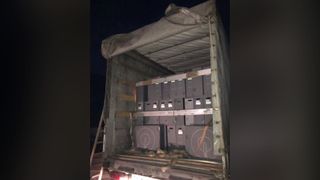How will Ukraine keep SpaceX's Starlink internet service online?
Elon Musk has some ideas.

SpaceX's Starlink internet is now active in Ukraine. But will the company be able to keep it online?
Russia's attacks on Ukraine continue to take lives and destroy infrastructure as the country invades. This infrastructure damage has disrupted internet access in Ukraine, leading a government official to publicly request Starlink satellite internet access for the country from SpaceX CEO Elon Musk. Musk obliged, activating Starlink service in Ukraine and sending additional hardware. But with continued attacks on infrastructure, how will Ukraine stay connected?
"@elonmusk @SpaceX @SpaceXStarlink many thx! Starlink keeps our cities connected and emergency services saving lives! With Russian attacks on our infra, we need generators to keep Starlinks & life-saving services online — ideas?" Mykhailo Fedorov, Ukraine's vice prime minister and the country's minister of digital transformation, who made the original request of Musk, asked on Twitter today (March 2).
Related: Geomagnetic storm sends 40 SpaceX satellites plummeting to Earth
@elonmusk @SpaceX @SpaceXStarlink many thx! Starlink keeps our cities connected and emergency services saving lives!With Russian attacks on our infra, we need generators to keep Starlinks & life-saving services online - ideas? @Honda @ChampionGen @westinghouse @DuroMaxPower pic.twitter.com/FkUZ6s08AOMarch 2, 2022
Fedorov brings up an important point: Even though Starlink operates without the need for traditional internet infrastructure, the Earth-bound hardware still needs power. And, as Russian attacks bombard the country, Ukraine's internet access will continue to be threatened.
Fedorov's statement publicly reached out for help acquiring generators to keep Starlink online for Ukrainians. But Musk responded with an alternative suggestion.
"Solar panels + battery pack better than generator, as no heat signature or smoke & doesn't run out of fuel," Musk wrote in response on Twitter.
Sign up for the Live Science daily newsletter now
Get the world’s most fascinating discoveries delivered straight to your inbox.

Fedorov's concern also points to the importance of internet access for the country under attack.
Internet connection enables what Fedorov described as "life-saving" communication, whether that be among family members displaced and separated by a missile attack or first aid teams trying to locate an injured person. Internet access is a critical component for those in Ukraine fighting to survive the invasion.
Editor's note: Fedorov replied to Musk later today, stating:
"Good point - should work even with Ukrainian winters! We will keep you posted as we roll out more Starlinks across the country. THANK YOU again for helping us out with @SpaceXStarlink - this will save a lot of lives."
Russian criticism
Dmitry Rogozin, the director-general of Russia's space agency Roscosmos, has been publicly outspoken on Twitter about the effects of the war on outer space relations. Most recently, Rogozin announced that Roscosmos would halt UK-based internet satellite company OneWeb's launch, planned for Friday (March 4) aboard a Russian Soyuz rocket, if the company and the UK government did not meet certain demands.
Now, Rogozin is speaking out about SpaceX's provision of Starlink service to Ukraine, according to a statement translated and shared by space enthusiast Katya Pavlushchenko.
Dmitry @Rogozin to Russia Today: "When Russia implements its highest national interests on the territory of Ukraine, @elonmusk appears with his Starlink which was previously declared as purely civilian. Here is this mud (мурло) opened himself..." https://t.co/8htcXn0YmnMarch 2, 2022
"When Russia implements its highest national interests on the territory of Ukraine, @elonmusk appears with his Starlink which was previously declared as purely civilian," Rogozin stated, both referring to the invasion as an implementation of national interests as well as referring to the country of Ukraine as a territory.
"I warned about it, but our "muskophiles" said — he is the light of the world [of] cosmonautics. Here, look, he has chosen the side. I don't even blame him personally. This is the West that we should never trust," Rogozin added.
Email Chelsea Gohd at cgohd@space.com or follow her on Twitter @chelsea_gohd. Follow us on Twitter @Spacedotcom and on Facebook.
Chelsea Gohd joined Space.com as an intern in the summer of 2018 and returned as a Staff Writer in 2019. After receiving a B.S. in Public Health, she worked as a science communicator at the American Museum of Natural History. Chelsea has written for publications including Scientific American, Discover Magazine Blog, Astronomy Magazine, Live Science, All That is Interesting, AMNH Microbe Mondays blog, The Daily Targum and Roaring Earth. When not writing, reading or following the latest space and science discoveries, Chelsea is writing music, singing, playing guitar and performing with her band Foxanne (@foxannemusic). You can follow her on Twitter @chelsea_gohd.

